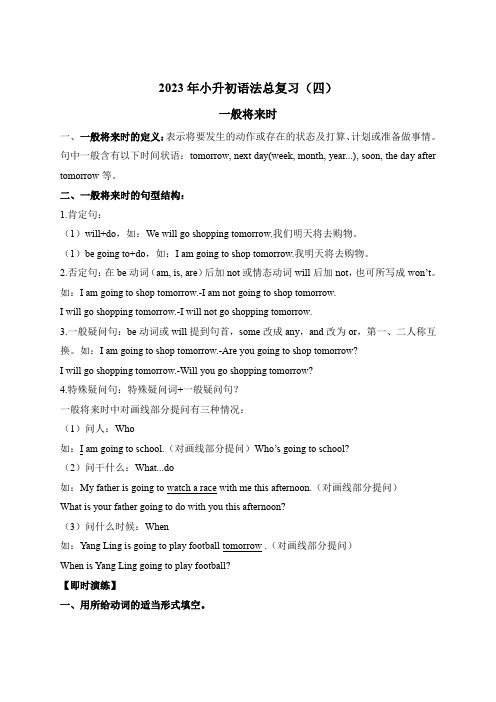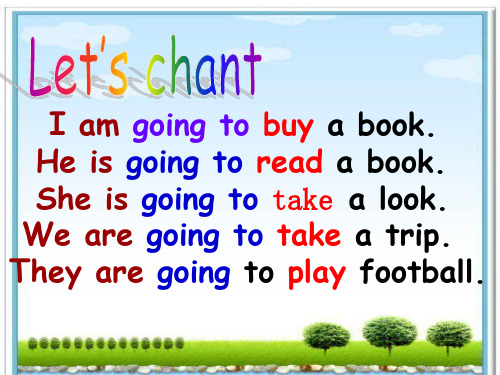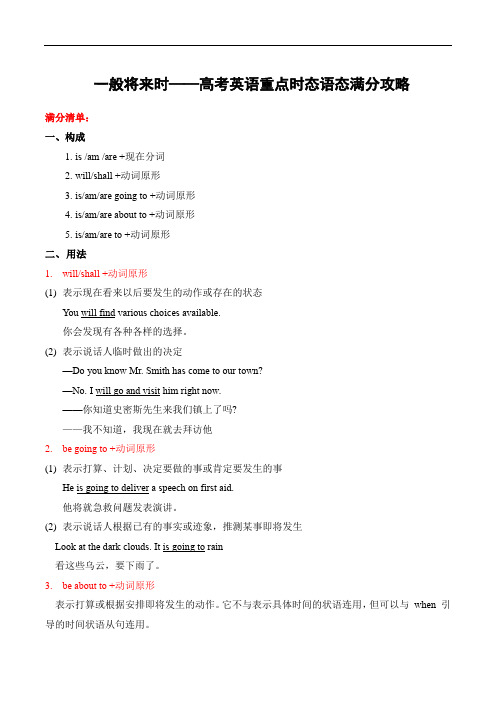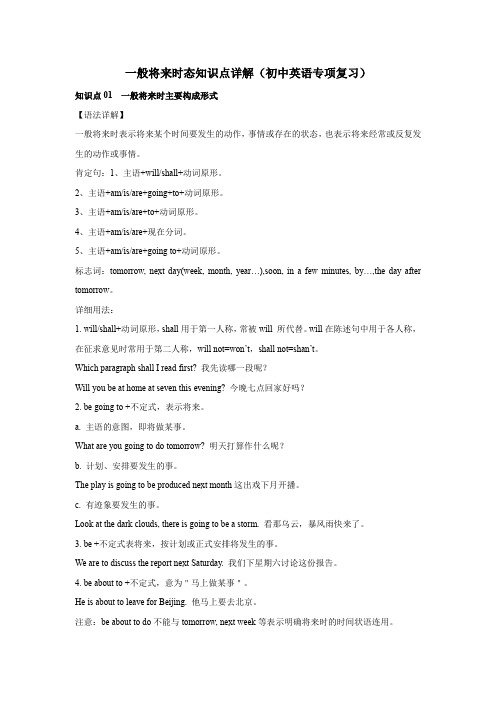一般将来时复习要点
2023年小学英语六年级小升初语法总复习(四)一般将来时 (译林版含答案)

2023年小升初语法总复习(四)一般将来时一、一般将来时的定义:表示将要发生的动作或存在的状态及打算、计划或准备做事情。
句中一般含有以下时间状语:tomorrow, next day(week, month, year...), soon, the day after tomorrow等。
二、一般将来时的句型结构:1.肯定句:(1)will+do,如:We will go shopping tomorrow.我们明天将去购物。
(1)be going to+do,如:I am going to shop tomorrow.我明天将去购物。
2.否定句:在be动词(am, is, are)后加not或情态动词will后加not,也可所写成won’t。
如:I am going to shop tomorrow.-I am not going to shop tomorrow.I will go shopping tomorrow.-I will not go shopping tomorrow.3.一般疑问句:be动词或will提到句首,some改成any,and改为or,第一、二人称互换。
如:I am going to shop tomorrow.-Are you going to shop tomorrow?I will go shopping tomorrow.-Will you go shopping tomorrow?4.特殊疑问句:特殊疑问词+一般疑问句?一般将来时中对画线部分提问有三种情况:(1)问人:Who如:I am going to school.(对画线部分提问)Who’s going to school?(2)问干什么:What...do如:My father is going to watch a race with me this afternoon.(对画线部分提问)What is your father going to do with you this afternoon?(3)问什么时候:When如:Yang Ling is going to play football tomorrow .(对画线部分提问)When is Yang Ling going to play football?【即时演练】一、用所给动词的适当形式填空。
小学英语一般将来时复习

go 1.Did you ______( go) to school yesterday?
works work ) in a school . 2. My sister______( watch ( not watch) TV yesterday. 3.Mike didn't _________
doesn't go 4. He ___________( not go)to work by car.
Goodbye!
现在进行时: 表示正在干什么。 句型: 主语+{be动词 is are am}+动词ing。
I am reading. she is running. They are swimming.
Where
句型转换。 1.Mike is going to play football
tomorrow.( 改为否定句) ______________________________. Mike is not going to play football tomorrow 2.I am going to get up at 6:30 tomorrow . ( 改为一般疑问句) Are you going to get up at 6:30 tomorrow _______________________________? 3.我打算去看电影下周末。( 汉译英。)
_______________________________
I am going to the cinema next weekend.
4. They played chess yesterday. They are playing ____ ______ _____chess now.(用now来 改写句子。) They are to play chess 5.____ ___ going ___ ___ ____ tomorrow. (用tomorrow 来改写句子。) 或者They _____
一般将来时——高考英语重点时态语态满分攻略

一般将来时——高考英语重点时态语态满分攻略满分清单:一、构成1.is /am /are +现在分词2.will/shall +动词原形3.is/am/are going to +动词原形4.is/am/are about to +动词原形5.is/am/are to +动词原形二、用法1.will/shall +动词原形(1)表示现在看来以后要发生的动作或存在的状态You will find various choices available.你会发现有各种各样的选择。
(2)表示说话人临时做出的决定—Do you know Mr. Smith has come to our town?—No. I will go and visit him right now.——你知道史密斯先生来我们镇上了吗?——我不知道,我现在就去拜访他2.be going to +动词原形(1)表示打算、计划、决定要做的事或肯定要发生的事He is going to deliver a speech on first aid.他将就急救问题发表演讲。
(2)表示说话人根据已有的事实或迹象,推测某事即将发生Look at the dark clouds. It is going to rain看这些乌云,要下雨了。
3.be about to +动词原形表示打算或根据安排即将发生的动作。
它不与表示具体时间的状语连用,但可以与when 引导的时间状语从句连用。
Ladies and gentlemen, you are about to hear a most incredible tale.女士们,先生们,你们马上就要听到一个令人非常难以置信的故事。
4.be to +动词原形(1)表示按计划或安排要做的事情The opening ceremony is to take place next Sunday.开幕式将于下周日举行。
(2)表示按职责、义务将要发生的动作You are to report it to the police.你应该报警。
一般将来时态知识点详解(初中英语专项复习) (4)

一般将来时态知识点详解(初中英语专项复习)知识点01 一般将来时主要构成形式【语法详解】一般将来时表示将来某个时间要发生的动作,事情或存在的状态,也表示将来经常或反复发生的动作或事情。
肯定句:1、主语+will/shall+动词原形。
2、主语+am/is/are+going+to+动词原形。
3、主语+am/is/are+to+动词原形。
4、主语+am/is/are+现在分词。
5、主语+am/is/are+going to+动词原形。
标志词:tomorrow, next day(week, month, year…),soon, in a few minutes, by…,the day after tomorrow。
详细用法:1. will/shall+动词原形,shall用于第一人称,常被will 所代替。
will在陈述句中用于各人称,在征求意见时常用于第二人称,will not=won’t,shall not=shan’t。
Which paragraph shall I read first? 我先读哪一段呢?Will you be at home at seven this evening? 今晚七点回家好吗?2. be going to +不定式,表示将来。
a. 主语的意图,即将做某事。
What are you going to do tomorrow? 明天打算作什么呢?b. 计划、安排要发生的事。
The play is going to be produced next month这出戏下月开播。
c. 有迹象要发生的事。
Look at the dark clouds, there is going to be a storm. 看那乌云,暴风雨快来了。
3. be +不定式表将来,按计划或正式安排将发生的事。
We are to discuss the report next Saturday. 我们下星期六讨论这份报告。
一般将来时知识点

一般将来时知识点一般将来时是英语中常用的一种时态,用来表示将来发生的动作或状态。
在句子中,一般将来时通常由助动词"will"或"shall"加动词原形构成。
除了表示将来的动作或状态外,一般将来时还可以表示决心、意图、预测、承诺以及请求等不同的语义。
下面是一些一般将来时的知识点:1.一般将来时的基本结构:主语 + will/shall + 动词原形+ …例如:- I will visit my grandparents tomorrow.(我明天会去看望我的祖父母。
)- He shall help you with the project.(他会帮助你完成这个项目。
)2.一般将来时的否定形式:主语 + will not/shall not + 动词原形+ …例如:- They will not arrive on time.(他们不会准时到达。
)- She shall not attend the meeting.(她不会参加会议。
)3.一般将来时的疑问形式:将助动词"will"或"shall"提前到句子的主语之前,并且将句末的问号加在句子结束处。
例如:- Will you come to the party?(你会来参加聚会吗?)- Shall we go for a walk?(我们去散步好吗?)4.一般将来时与时间状语的搭配:一般将来时经常和表示将来时间的状语词或短语一起使用,如:tomorrow(明天)、next week(下周)、in the future(在未来)等。
例如:- We will have a meeting tomorrow.(我们明天有个会议。
)- She shall complete the report next week.(她下周会完成这份报告。
)5.一般将来时表示打算、意图:一般将来时也经常用来表示打算、意图或计划要做某事。
一般将来时的知识点归纳

一般将来时的知识点归纳关于一般将来时的知识点,在英语的语法中,一般将来时可以表达或者推测将来发生的动作或状态,主要包括:将来现在完成时(Future Perfect)以及将来简单时(Future Simple),对应着中文中的“将来完成时”、“一般将来时”等概念。
将来完成时由这几种变异组成:将来完成完成式(Future Perfect Continuous)、将来完成式(Future Perfect)、将来完成进行式(Future Perfect Continuous)。
它们的复合形式表达将来某个时间段内完成的动作,几种变异及其语法如下:(1)将来完成式(Future Perfect)语法结构为:will/shall have + 过去分词其用法有:主句用will/shall have,它可以表达将来某一特定时间前发生的动作或状态,而且仍将持续到将来某一时间。
例如:By next week, I will have tidied the room. 到下周时,我将把房间打扫干净。
(2)将来完成进行式(Future Perfect Continuous)语法结构为:will/shall have+ been + 动词-ing 形式其用法有:表示将来某一时间前持续进行的动作。
例如:By the end of this month, I will have been living here for five years. 到本月底,我将已在这里住了5年。
(3)将来简单式(Future Simple)语法结构为:will/shall + 动词原形其用法有:指示将来将发生的事情,即将要发生的动作或意向。
例如:I will call him tomorrow. 我明天会打电话给他。
总之,一般将来时是英语中非常常用的语法时态结构,它可以用来表示将来发生的动作或者将要发生的意向,在英语语法学习中占据了不可忽略的地位。
2024年中考英语语法复习—一般将来时课件

2)用在由when,if等引导的时间状语从句和 条件状语从句中,表示将来的动作。
If it doesn’t rain tomorrow,we will go hiking. 如果明天不下雨,我们将去远足。
★一般将来时经常会伴随一些时间状语,比较常见的有:
tomorrow
soon
next week下周
练习
1 . There ________ a sports meet next week if it
________.
A.is going to have; doesn’t rain
B.is going to be; doesn’t rain
C.is going to be; won’t rain D.is going to have; won’t rain
Will you go there? 你要去那儿吗?
“Shall I...?”“Shall we...?”常用来征求对方意见。“Will you...?”表示客气的邀请或请求。
Will you please open the window? 请你把窗打开,好吗?
3.否定句:在will/shall后加not,可缩写成 won’t/shan’t 陈述句:I will go there./I shall go there. 我要去那儿。
to +
+其他
not,即主语+be not going
I am not going to watch the video. 我不准备去看录像。
3)一般疑问句:将be
Is he going to see a doctor? 他准备去看医生吗?
4)含有be goi to+动词原形+其他
初中英语语法复习:一般将来时

初中英语语法复习:一般将来时一般将来时表示将来某一时刻的动作或状态,或将来某一段时间内经常的动作或状态。
常与一些表示将来的时间状语连用,如:tomorrow(明天),next week(下周),from now on(从现在开始);in the future(将来),in a few days等。
1、基本结构:be going to+动词原形 2. will+动词原形一般将来时:be going to+动词原形一般将来时:will+动词原形2. will 和be going to 的区别will 和be going to一般可以互用,但有时有区别:1)含时间和条件状语从句,如果主句是将来时,多用will.2)如果不是以人的意愿为转移,将来肯定会发生的动作和状态,多用will3)be going to根据迹象推测,有可能发生的事情或计划要做的事情。
3. there be 句型的一般将来式:1.There is/are going to be 2. There will be一、单项选择1.The old scientist ______ us a talk on future life next week.A.gives B.gave C.will give D.is giving2.—Jim, what are you going to do this weekend?—I ______ a movie with my dad.A.am watching B.watch C.watched D.am going to watch3.—Where’s mum?—She is trying on the new dress upstairs now. She _________ it to a party.A.wears B.wore C.will wear D.is wearing4.—What are you going to do next weekend?—There __________ a basketball match next Sunday. I want to watch it.A.will be B.will have C.is going to have D.are going to be 5.—Which team ________ the football match?—I’m not sure. The two teams both play well. Let’s wait and see.A.wins B.won C.is winning D.will win 6.Robots ________ us do some heavy and difficult jobs in the future.A.help B.helped C.are helping D.will help7.—What are you going to do next weekend, Wang Hui?—I ________ my grandparents next Sunday.A.visit B.visitedC.am visiting D.am going to visit8.I don’t know if it ________ sunny tomorrow. If it ________ sunny, I will go fishing. A.will be; is B.is; will beC.will be; is going to be D.is; is9.We are going to have a farewell party ________.A.now B.every day C.last week D.next Friday 10.There is going to ________ a basketball match tomorrow.A.be B.have C.is D.are11.Look at the dark clouds in the sky. It ________.A.is going to rain B.rained C.raining D.rainy 12.What ________you ________for tomorrow’s party?A.did; wear B.will; wear C.do; going to wear D.do; do13.He ________ busy this week. He ________ free next week.A.is; is B.will; will be C.is; will be14.There are many black clouds in the sky. It ________ soon.A.will rain B.rains C.rained D.is raining 15.It ________ warm in Dalian tomorrow.A.will be B.is C.does16.She will ________ a book about animals after school.A.buys B.buy C.is buy D.going to buy 17.Mike ________ his room yesterday, and he is going to ________ his homework tomorrow. A.cleaned; do B.cleaned; did C.clean; do18.—Our library is bright and beautiful.—Yes. Will you ________ us ________ it?A.shows; to B.show; aroundC.shows; around D.show; to19.Look! There are a lot of clouds in the sky. It is going to _______ soon.A.rains B.rainy C.be raining D.be rainy20.Li Ming ______ a T-shirt tomorrow.A.buys B.bought C.buy D.will buy 21.Sarah and I ______ a film next Sunday. We ______ horses last Sunday.A.am going to see; rode B.are going to see; rode C.will see; ride 22.—What are you going to do this weekend?—_______A.I’m going to visit my grandparents.B.I’m fine.C.I’m watching TV.D.I’m cleaning the room.23.—Peter! What is your plan for this Sunday?—I ________ my grandmother. She is in hospital.A.visit B.am visiting C.am going to visit 24.It’s cloudy all day today, but it ________ tomorrow.A.changes B.changed C.will change D.is changing 25.—Can your sister ________?—No, she can’t. But she ________ to swim next month.A.swims; is learning B.swim; is learningC.swims; is going to learn D.swim; is going to learn26.—When ________ you come back from London, Mary?—Last week. The River Thames is really beautiful and I ________ it again.A.do; visit B.did; visit C.do; am visiting D.did; will visit 27.This is our last night in China. We ________ home tomorrow.A.will fly B.fly C.flies D.flew 28.—Schools ________ different in the future.—Yes, you are right.A.is B.are C.were D.will be 29.—Why are you in a hurry, Cindy?—There ________ a basketball match between Class One and our class at 3 o’clock.A.are going to be B.will haveC.is going to have D.will be30.Tony _________ the Great Wall with his classmates next Sunday morning.A.visited B.visits C.will visit D.visit31.There ________ a sports meeting in our school next week.A.was B.were C.are D.is going to be 32.You can borrow this film—surely you _________ watching it.A.enjoy B.enjoyed C.will enjoy D.are enjoying 33.—Why are you in such a hurry, Peter?—I________ a basketball match between Class One and our class in ten minutes.A.join in B.am joining in C.joined in D.am going to join in 34.Robots and machines people do more work in the future.A.help B.will help C.are helping D.helped 35.After this exam, you ________ a wonderful holiday next month. Take it easy!A.have B.has C.had D.will have36.If it ______ rain tomorrow, my family ______ go for a walk in the park.A.isn’t, will B.doesn’t, willC.won’t, will D.won’t be, will37.—It’s hot here.—I ________ and open the window.A.go B.went C.am going D.will go 38.—When ________ Lingling ________ litter with her friend?—Next Saturday morning.A.does; collect B.did; collect C.will; collect D.is; collecting 39.Perhaps we ________ able to connect our minds to the Internet in the future.A.are B.were C.have been D.will be 40.—What’s your plan for the new term?—I ________ English well.A.learn B.learnedC.am learning D.am going to learn41.—Are you free? I’d like you to go to the museum with me.—Sorry, there _______ some important meetings this coming weekend.A.is going to have B.will have C.are going to be D.is going to be 42.There ________ schools in the future. Students will study at home.A.is going to have B.will be C.won’t have D.won’t be 43.—How will students learn then?—They ________ by computers in the classroom.A.studies B.studied C.will study D.is studying 44.—What are you going to do, Betty?—I’m going ________ football this afternoon.A.play B.to play C.played D.playing45.We hope ________ a computer on every student’s desk in the future.A.there is B.there wasC.there will have D.there will be46.—What are you going to do this Sunday?—I ________ a picnic with my parents.A.have B.had C.am having D.am going to have 47.We hope there ________ a war in the world. Everyone can live a happy life.A.will not have B.will be not C.is not going to be D.is not going to have 48.If you interview the estate agent, he ________ you much information about housing. A.gives B.gave C.will give D.is giving 49.—The radio says it ________ rain this afternoon, isn’t it?—No. I think it will be sunny.A.will go to B.is going to C.shall go to D.will be 50.Where __________ you __________ have a meeting tomorrow?A.do; go B.will; go C.are; go D.are; going to二、完成句子51.My mother will be back in an hour. (改为否定句)My mother back in an hour.52.The students will study at home in the future. (改为一般疑问句)the students at home in the future?53.Things will be different in the future. (变为一般疑问句)things in the future?54.There is a football match at the sports hall every day.(用tomorrow改写句子)a football match at the sports hall tomorrow.55.Alice is going to do her homework this afternoon. (改为—般疑问句)Alice her homework this afternoon?56.They are going to take a walk in the park. (就划线部分提问)they to in the park?57.They will meet at the school gate at 7 a.m. on Saturday. (对画线部分提问)they at the school gate?58.I’m going to learn English well because it’s very useful.(对划线部分提问)you going to learn English well?初中英语语法复习:一般将来时答案1.C【详解】句意:下周这位老科学家将给我们做一个关于未来生活的报告。
- 1、下载文档前请自行甄别文档内容的完整性,平台不提供额外的编辑、内容补充、找答案等附加服务。
- 2、"仅部分预览"的文档,不可在线预览部分如存在完整性等问题,可反馈申请退款(可完整预览的文档不适用该条件!)。
- 3、如文档侵犯您的权益,请联系客服反馈,我们会尽快为您处理(人工客服工作时间:9:00-18:30)。
一般将来时复习要点
一、概念:表示将要发生的动作或存在的状态及打算、计划或准备做某事。
句中一般有以下时间词:
tomorrow, tonight,
one week later / two days later,
this morning / afternoon / evening
next week / month / year / Sunday...
二、基本结构:
①be going to + do;(强调包括be包括am,is,are,根据不同人称来用,而且不能少,少了就不得分)
第一人称:I am going to......
第三人称:He/she/Zhang peng/ Amy is going to.....
第一、三人称复数:We are going to.....
They are going to.....
②will+ do. Will和be going to + do意思一样。
三、否定句:
在be动词(am, is, are)之后加not或情态动词will后加not成won’t.
例如:I’m going to have a picnic this afternoon.→ I’m not going to have a picnic this afternoon.
四、特殊问句:
一般将来时有三种情况:
1. 问打算去哪儿。
Where are you going?I’m going to New York .
2. 问打算干什么。
What are you going to do tomorrow?.I’m going to visit my grandparen ts. What is your father going to do this afternoo n.?He is going to buy a book.
3. 问打算什么时候。
When.are you going? .I’m going this afternoon.
五、同义句:be going to = will
I am going to go swimming tomorrow(明天). = I will go swimming tomorr ow.
六、作文:
我将会有一个忙碌的周末。
在星期六,我将在上午做我的作业。
在星期六的下午,我将阅读一本漫画书。
我将在星期天上午去看一场电影。
在星期天下午,我将和我的朋友一起去购物。
我想那一定会很有趣。
I am going to have a busy weekend.On Saturday,I am going to do my hom ework in the morning.On Saturday afternoon,I am going to read a comic book.I am going to see a film on Sunday morning.On Sunday afternoon, I am going to go shopping with my friends. I think that will be fun.
用所给词的适当形式填空。
(注意时态!!!)
1 .Today is a sunny day. We ________________ (have) a picnic this afternoo n.
2. My brother _______________ (go) to Shanghai next week.
3.Tom often ______________(go) to school on foot. But today is rain. He __ ____________ (go) to school by bike.
4.What do you usually do at weekends? I usually __________ (watch) TV an
d ____________(catch) insects?
5.What ___________ (d o) you do last Sunday? I ____________ (pick) apples
on a farm. What ______________ (do) next Sunday? I ______________ (m ilk) cows.
6.Mary ____________ (visit) her grandparents tomorrow.
7. Liu Tao ____________ (fly) kites in the playground yesterday.
8. David ______________ (give) a puppet show next Monday.
9.I ________________ (plan) for my study now.
10. I ________________________ (see) a film tomorrow.
11. A: What _______ you __________________ (do) next Saturday?
B: I _______________________________(swim) with my parents.
12. There _____________ (be) a party in our school.
13. Mike _______________ (visit ) his grandparents next week.
14. He ______(buy)a bike the day after tomorrow.
15. I ________ (fly)a kite with my father next week.
16. He will not _________ (go) school tomorrow.。
